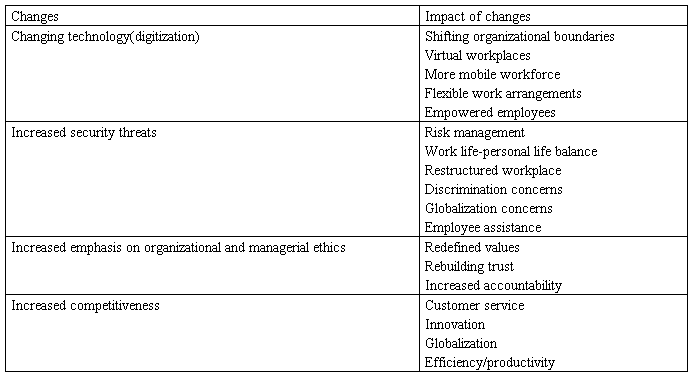罗宾斯管理学读书笔记一
Chapter 1 Introduction to management and organizations
? Who are managers?
A manager is someone who coordinates and oversees the work of other people so that organizational goals can be accomplished.
? How do we define who managers are?
We have first-line managers, the lowest level of management ,manage the work of nonmanagerial employees who typically are involved with producing the organization’s products or servicing the organization’s customers. First-line managers often have the title of supervisor, but they may also called shift managers, district managers, department managers, office managers, or even foreperson. Middle managers include all levels of management between the first level and the top level of the organization. These managers manage the work of first-line managers and may have titles such as regional manager, project leader, plant manager, or division manager. At or near the upper levels of the organizational structure are the top managers, who are responsible for making organization-wide decisions and establishing the plans and goals that affect the entire organization. These individuals typically have titles such as executive vice president, president, managing director, chief operating officer, chief executive officer, or chairperson.
? What is management?
Management involves coordinating and overseeing the work activities of others so that their activities are completed efficiently and effectively.
Efficiency refers to getting the most output from the least amount of inputs.
Effectiveness is often described as doing things right, that is, not wasting resources.
? What do managers do?
Management researchers have, after many years of study, developed three specific categorization schemes to describe what managers do: functions, roles, and skills.
Management functions
Planning: managers define goals, establish strategies for achieving those goals, and develop plans to integrate and coordinate activities.
Organizing: managers are responsible for arranging and structuring work to accomplish the organization’s goals.
Leading: managers motivate subordinate, help resolve work group conflicts, influence individuals or teams as they work, select the most effective communication channel, or deal in any way with employee behavior issues.
Controlling: managers have to monitor, compare and correct everything that is deviating.
Management roles
The term management roles refers to specific categories of managerial behavior.
Interpersonal roles are roles that involve people and other duties that are ceremonial symbolic in nature. The three interpersonal roles include figurehead, leader, and liaison.
Informational roles involve collecting, receiving, and disseminating information. The three informational roles are monitor, disseminator, and spokesperson.
Decisional roles entail making decisions or choices. The four decisional roles are entrepreneur, disturbance handler, resource allocator, and negotiator.
Management skills
Technical skills are the job-specific knowledge and techniques needed to proficiently perform specific tasks. These skills tend to be more important for lower-level managers because they typically are managing employees who are suing tools and techniques to produce the organization’s products or service the organization’s customers.
Human skills involve the ability to work well with other people both individually and in a group. Because managers deal directly with people, these skills are essential and equally important at all levels of management.
Conceptual skills are the skills managers use to think and to conceptualize about abstract and complex situations. Using these skills, managers must see the organization as a whole, understand the relationships among various subunits, and visualize how the organization fits into its broader environment.
? How the manager’s job is changing

? What is an organization?
An organization is a deliberate arrangement of people to accomplish some specific purpose.
? Becoming a manager
1. Keep up with current business news.
2. Read books about good and bad examples of managing.
3. Remember that one of the things good managers do is discover what is unique about each person and capitalize on it.
4. Keep in mind the simple advice of the late Peter Drucker, who has been called the most influential management thinker of the twentieth century: management is about people.
5. Work on your soft skills—work ethic, communications, information gathering, and people skills. These are what employers cite as the most important factors for getting jobs.
6. Observe managers and how they handle people and situations.
7. Talk actual managers about their experiences—good and bad.
8. Get experience in managing by taking on leadership roles in student organizations.
9. Start thinking about whether you’d enjoy being a manager.
第二篇:经济管理学书读书心得
经济管理学书读书心得
《目标—简单而有效的常识管理》是以小说的形式介绍企业管理知识的一本书。主人公罗哥是一家工厂的厂长。罗哥本人虽然每天辛辛苦苦工作到很晚,以至于妻子也不能原谅他,家庭关系非常紧张。但是工厂就是不景气,不断出现亏损,总公司决定如果他的工厂三个月内不能扭亏为盈的话,就会关闭这家工厂。客户的抱怨和来自上级的压力以及家庭关系的紧张使他很苦恼。苦苦思索如何解决遇到的麻烦的罗哥遇到了大学期间的老师钟纳。在他苏格拉底式的提示下,罗哥逐渐找到了问题的关键,一步一步解决掉一系列麻烦。三个月后不但工厂扭亏为盈,避免了被关闭的危险,而且罗哥的家庭关系也得到了转机。 读这本书最大的心得就是一定要明确自己的目标,一定要把眼光放在整个组织上,不着眼于局部效益,解决问题要围绕目标抓住关键点。
我们在工作中经常会遇到复杂而且多变的问题,这时候我们如果把目光紧紧盯在所遇到的具体问题上,而忽略了全局的思考就有可能陷入被动。《目标》这本书就告诉我们一个道理,越复杂的问题越需要化繁为简的智慧,而确立目标就是最重要的一步。就像书中主人公的老师钟纳问罗哥的一个最简单的问题一样:“对一个制造业的工厂来说,他的目标是什么?”主人公罗哥,脑子里会有很多答案,但他的老师告诉他,目标只有一个,就是“赢利”。只有纵观全局,系统思考,明确了目标才知道做事的方向,接着才会想到如何去做事。
在我们的日常工作中也经常陷入诸多复杂的流程和惯例之中不能自拔。一种情况就是典型的本位主义,整个集体的目标与每个部门和单位的目标不一致,导致局部最优却不能保证全局最优。另一种情况就是复杂问题的复杂化,甚至简单问题的复杂化,以至于与目标背道而驰。把目标量化和分解为具体的衡量指标是解决问题行之有效的方法,但也要求我们要时刻关注组织本身的变化和组织所处环境的变化,时常将量化指标与目标相对照,始终保持量化指标与目标一致。
一个组织中每个局部环节的最优不一定意味着全局的最优!书中罗哥的工厂里使用了机器人之后,确实在个别工序中得到了优化,但是却没能解决效率最低的工序,即瓶颈工序的效率问题,因而不但不能带来全局性的优化,凡而损害了整体的最优,只有当他解决了瓶颈工序的效率问题后才达到了“赢利”这一目标。这使我们认识到,那些认为“只要所有环节各自能做到最好,企业整体必然会有最大改进”的观点并不正确,而单单个别改进每个环节,往往事与愿违。大多数局部环节的改善无助于全局的改善,须围绕目标迅速找到问题的关键点,即书中所指的“瓶颈”,将有限的资源集中应用于全局中的关键环节,只有关键环节得到了解决,才能达到最大的效益,达成目标,问题才能迎刃而解。越复杂的问题越需要简单的解决方法!所谓提纲挈领就是这个意思,千头万绪之中如何以目标为导向,迅速找到问题的关键点并解决之,不仅是一个管理者必备的能力,也是一个人在日常生活中需要的一种能力!
书中老师钟纳对主人公罗哥的“苏格拉底式”的引导方式对我也有很大的启示。很多人一遇到问题就会去找答案,而不会先去分析问题的本身,总是期待别人能给自己答案,却又对所给的答案永远不满意。书中告诉我们要帮助一个人解决问题不是给他鱼吃,也不是教他如何钓鱼,而是以问问题的方式来告诉他如何判断哪里有鱼可钓,让他自己研究用什么方法才能钓得到鱼。我们在遇到问题时都应该学会在没有外力协助的情况下,要具有回答三个问题的能力:“应该改变哪些事情?”、“要朝什么方向改变?”、“要如何改变?”。每个人都要学会做自己的“钟纳”。
